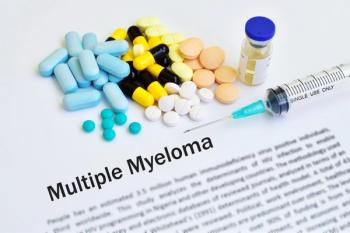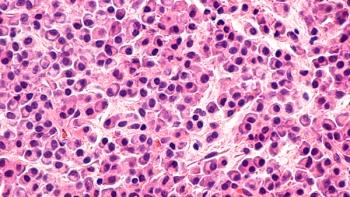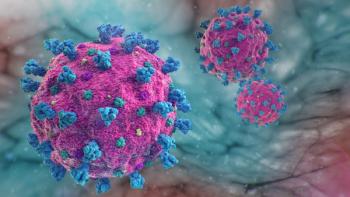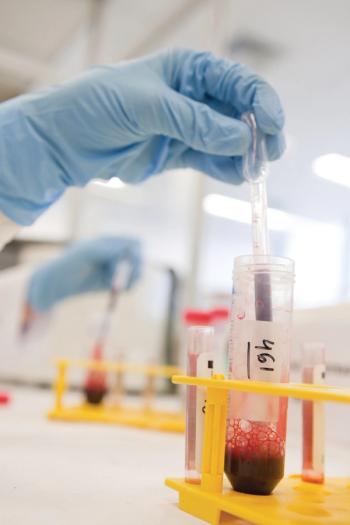
Hematology
Latest News

Latest Videos

CME Content
More News

Only about one-third of patients with multiple myeloma who experience a very good partial response to therapy following first relapse, according to a new study.

While minimal residual disease has become an important way to track how patients respond to therapies for multiple myeloma, the treatment implications of the metric are not yet clear, according to a review article.

A new analysis of bone marrow plasma cells has helped to identify two biomarkers for multiple myeloma, which appear to play a role in the prognosis and clinical characteristics of the disease.

Scientists do not yet have a full understanding of how multiple myeloma develops, but a new article suggests the gut microbiome is one factor that may play a role.

A new study that looked at a cohort of 58 patients with multiple myeloma (MM) who contracted COVID-19 found the disease itself does not appear to be linked with higher mortality when these individuals are hospitalized.

There are promising signs that chimeric antigen receptor (CAR) T-cell therapies might lead to meaningful advances in the therapy of multiple myeloma. However, investigators will first need to clear a number of key hurdles.

Minimal residual disease (MRD) status has been shown to be a better indicator of the prognosis of a patient with multiple myeloma (MM) than “complete remission.” Yet, it’s still not widely used in the clinic. A new article examines the problem.

Bayer AG agreed to settle the majority of claims alleging its product Roundup causes blood cancer; Census Bureau data show a historic demographic shift; a federal lawsuit claims Regeneron funneled millions of dollars to a charity.

The American Society of Hematology has adopted 10 of the recommendations from Choosing Wisely to encourage more high-value care, but barriers to adoption remain.

A new survey finds patients, caregivers, and medical professionals have somewhat different priorities when considering treatment options for multiple myeloma.

Patients with sickle cell disease who do not receive treatment can die from the disease, but diagnostic resources are scarce in some parts of the world where the disease is most prevalent. A new smartphone-based method could change that.

A new large randomized trial indicates induction therapy including lenalidomide is optimal in patients with multiple myeloma who are transplant-eligible. Maintenance with lenalidomide was preferable to observation alone following transplant.

Patients with multiple myeloma (MM) face higher risks of certain metabolic syndromes, but new research suggests those risks exist even in patients with smoldering MM.

As investigators have learned more about how to diagnose and categorize smoldering multiple myeloma (SMM), a new review article argues there’s insufficient data to evolve beyond a close observation approach.

A new review article outlining research into multiple myeloma with central nervous system (CNS) involvement explains the many reasons it is difficult to diagnose and treat the disease.

Helping patients find a clinician who is experienced with sickle cell disease can have many positive benefits, a new study noted.

Clinicians use the presence or absence of minimal residual disease as a metric by which to judge the efficacy of therapy in patients with hematological malignancies. A new review article interrogates whether that approach aligns with patient-centered outcomes.

New advances in therapy have led to better long-term survival rates in patients with hematologic malignancies, but there are some caveats to the good news.

It’s rare for a patient to be diagnosed with both acute myeloid leukemia and multiple myeloma at the same time, but a new case study suggests there are options to treat both diseases at the same time in such cases.

A new study based on interviews with families and patients undergoing chronic transfusion therapy for sickle cell disease finds that the therapy affects the families in ways that extend beyond health.

New data suggests white patients who are deficient in vitamin D have lower rates of survival when diagnosed with multiple myeloma. The phenomenon was not seen, however, in African American patients.

New research suggests disparities in incidence and survival rates in multiple myeloma may have a lot to do with healthcare quality and access to care.

Outcomes were worse for patients with multiple myeloma (MM) and extramedullary disease, and the authors said their findings indicate that evaluation of extramedullary response using imaging is needed in this group.

Recent study results show that patients with cancer who develop coronavirus disease 2019 (COVID-19) are far more likely to die than those who develop COVID-10 but do not have cancer. Patients being treated with immunotherapy appear to be at particularly high risk.

A new article outlining the experience of a patient with a history of multiple myeloma (MM) who contracted coronavirus disease 2019 (COVID-19) shows the interleukin-6 receptor inhibitor tocilizumab was an effective therapy.


















